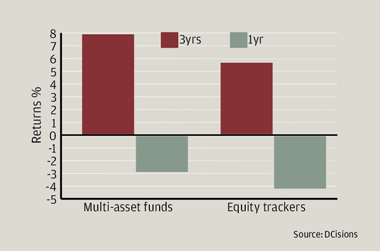Risk-based benchmarks introduced for DC
Multi-asset funds have given defined contribution savers better risk-adjusted returns than passive equity trackers over the past three years.
Despite this, the use of a 100% equity investment default for DC schemes remains widespread.
A study of 24 asset managers by data firm DCisions concluded multi-asset funds with fees of between 50 and 100 basis points (bps) had offered better value for money than equity funds with fees of fewer than 50bps, over the past three years.
During this time multi-asset funds returned 7.9% on a risk-adjusted basis, compared with equity trackers’ 5.6%.
Over the past year, multi-asset funds returned -2.8%, taking less of a hit than the equity trackers at -4.1%.
The finding is part of DCisions’ 2012 Calibrating DC Outcomes report, which seeks to overcome the difficulty of finding common benchmarks for DC funds.
The report rates funds against risk-graded benchmarks to assess the returns of default funds on a risk-adjusted basis.
Nigel Aston, business development director for DCisions, said: “The DC multi-asset fund market, where each product has a self-selected benchmark, defies meaningful comparisons.
Our risk-graded benchmarks demonstrate the value these solutions deliver on a risk-adjusted basis
“Our risk-graded benchmarks enable fund managers, schemes and consultants to demonstrate the value these solutions deliver on a risk-adjusted basis.”
The poor risk-return on equity trackers over the past three years has been mirrored by a decline in their popularity.
A DCisions survey of 30 schemes found the use of passive equity trackers had fallen from 63% to 48% since 2006, while the use of multi-asset funds, target date funds and bespoke solutions had all risen.
The trend was confirmed by Jesal Mistry, a senior consultant at Aon Hewitt, who said the volatility of equity trackers was having a negative impact on employees.
“There is much more of a behavioural finance link to DC than there used to be,” he said. “There is now less emphasis on outcome [maximising returns] than there is on the journey.”
And Mistry said the consultancy was now much more likely to recommend a multi-asset fund or a diversified growth fund – which are seen as more stable investments – than a passive equity tracker.
He added: “However, some clients could almost be looking at quadrupling costs for members from a very low 15bps-20bps up to half a percent or above.
“The message to members is very difficult and this is why it has taken such a long time to change.”
The report is being launched this week, in association with Pensions Week and schemeXpert.com.


